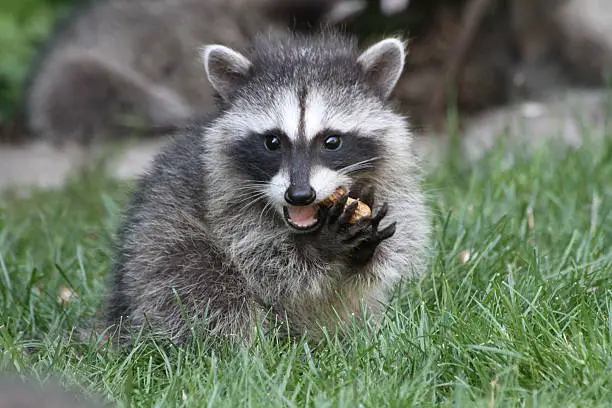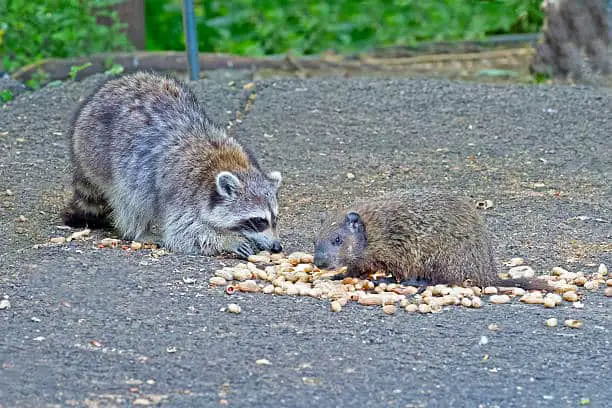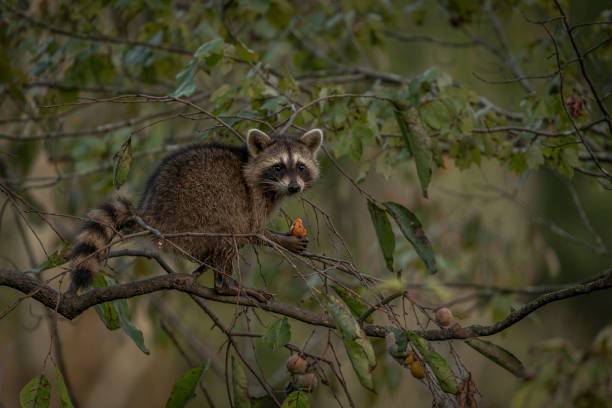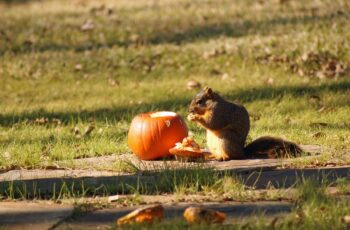eRaccoons are a common sight in many areas, known for their curious and mischievous nature. These omnivorous mammals have a wide diet that includes both plant- and animal-based foods. However, there is often confusion surrounding what foods are safe for raccoons to consume, particularly when it comes to nuts. Many people wonder, “Can raccoons eat almonds? Can raccoons eat nuts? What nuts can raccoons eat?” In this article, we will explore the topic of raccoons and nuts, providing answers to these questions and more.
Nuts are a popular snack for many humans, and it’s only natural to wonder if they can share these tasty treats with their furry friends. It’s common knowledge that raccoons are opportunistic eaters, often scavenging for food in both urban and rural areas. However, the question remains, “What nuts can raccoons eat?” In this article, we will dive deep into the diets of these resourceful creatures to determine if nuts, particularly almonds, are a safe and suitable food for raccoons. Additionally, we will explore how other animals may also enjoy this nutritious nut. So, can raccoons eat almond seeds? Let’s find out.
Can raccoons eat almonds?
Raccoons have a varied and adaptable diet that includes both plant- and animal-based foods. While they may be known for rummaging through trash cans for scraps, they also have a taste for fruits, nuts, and grains. So, can raccoons eat almonds? The answer is yes; raccoons can eat almonds. In fact, almonds are a part of their natural diet, as they can be found in the wild. However, it is important to note that raccoons should not rely on almonds as their main food source.
as they do not provide all the necessary nutrients for their health and well-being. Additionally, salted or flavored almonds should be avoided, as they can be harmful to raccoons. It is always best to let raccoons forage for their own food and not intentionally provide them with snacks like almonds.

Can raccoons eat nuts?
Raccoons are skilled foragers and scavengers. They are often feed on a wide range of plant- and animal-based foods in their quest for sustenance. Nuts are a popular snack for many humans, and it’s only natural to wonder if raccoons can also enjoy these tasty treats. However, the question remains, “Can raccoons eat nuts?” In this article, we will discuss the dietary habits of raccoons to determine if nuts are a safe and suitable food for these curious creatures.
- What Sounds Do Raccoons Make When They Mate? (Video)
- How to Safely Clean a raccoon latrine
- How to Download macOS Sonoma 6k Wallpaper?
Nuts come in various shapes and sizes, each with its unique nutritional profile. With so many types available, it’s essential to understand what nuts, if any, are suitable for raccoons to consume. While these mammals have versatile diets, their digestive systems and dietary needs may differ from ours. As such, we will examine the potential benefits and risks associated with raccoons eating nuts to answer the question of whether they can safely do so.
What nuts can raccoons eat?
Raccoons are well known for their opportunistic feeding behavior and scavenging for food in both urban and rural areas. Given their diverse diet, many people wonder, “What nuts can raccoons eat?” In this article, we will explore the various types of nuts and determine which ones, if any, are suitable for raccoons to consume. By understanding the natural diet and needs of these creatures, we can determine which nuts, if any, are a nutritious and safe addition to their diet.

Can raccoons eat almonds?
What animals eat almonds?
Almonds have been observed to be consumed by a wide range of animals. These nuts are frequently eaten by squirrels, larger animals like deer and bears, and birds like bluejays and woodpeckers. Almonds’ high nutritional content—they are a good source of protein, healthy fats, and a variety of vitamins and minerals—draws these creatures to them. Furthermore, it’s known that some animals, like raccoons, eat almonds. The varied diet of raccoons, which are omnivores, includes fruits, nuts, insects, and small animals.
Raccoons gladly eat almonds when they get the chance, even though their main diet may change based on what’s available. It is also simple for them to break through the almond shells and remove the nutrient-rich nut within, thanks to their powerful jaws and pointed teeth. Given that raccoons include almonds in their diets and benefit from their nutritional value, this illustrates how adaptive and resourceful they are
Can raccoons eat almond seeds?
Raccoons are well-known scavengers and opportunistic feeders, with a varied diet ranging from fruits and vegetables to insects and small animals. However, when it comes to almond seeds, caution should be exercised. They can eat almon seeds but experts recommend not to give them. While there is no harm in raccoons occasionally snacking on almond seeds, these seeds contain cyanogenic compounds that can be toxic in large quantities.
Raccoons are known to have a strong digestive system, but they may struggle to fully break down and metabolize the compounds in almond seeds. This can potentially lead to gastrointestinal issues or even cyanide poisoning. It is important to limit the amount of almonds and other seeds in a raccoon‘s diet and to always consult a veterinarian if you suspect your raccoon has consumed a large quantity of almond seeds.

Can raccoons eat raw almonds?
Many humans enjoy raw almonds as a nutritious and protein-packed snack. However, raccoons may also come across raw almonds in their natural habitat, begging the question, “Can raccoons eat raw almonds?” Raccoons can surely eat raw almonds as they don’t have cooked ones in the wild. As scavengers, raccoons have been known to consume a wide variety of foods, but it’s essential to consider the safety and benefits of different foods for these curious creatures.
Raw almonds are the uncooked form of this popular nut, with a similar texture and flavor to roasted almonds. While they are safe for human consumption, are they also safe for raccoons? Like many nuts, raw almonds have a hard, protective shell that needs to be cracked open before the nut inside can be eaten. Raccoons have strong jaws and dexterous paws, making them well-equipped to open and consume raw almonds. However, it’s crucial to understand the potential risks associated with raccoons eating raw almonds, particularly for their health and digestion.
FAQ
1. Can raccoons safely eat almonds?
Yes, raccoons can safely eat almonds. However, they should be given in moderation and should not make up a significant portion of their diet.
2. How do raw almonds differ from other types of nuts for raccoons?
Raw almonds, like other nuts, have a hard outer shell that needs to be removed before consumption. Raccoons are well-equipped to open and eat raw almonds, but there may be potential risks associated with consuming them.
3. Are there any risks associated with raccoons eating almond seeds?
Raccoons may come across almond seeds in their natural habitat, particularly if they forage in areas where almonds are grown. While they can consume almond seeds, there are potential risks associated with eating them, such as choking or intestinal blockages. It’s best to consult a wildlife expert before introducing almonds or almond seeds to a raccoon’s diet.
Conclusion
In conclusion, while almonds are a tasty and nutritious snack for humans, it’s important to consider the safety and suitability of these nuts for other animals, particularly raccoons. These resourceful creatures have a diverse diet, but their digestive systems and dietary needs may differ from ours. By understanding their natural diet and behaviors, as well as the potential risks and benefits associated with consuming different types of nuts. We can determine if raccoons can safely eat almonds. It’s always best to consult a wildlife expert before introducing any new foods to a raccoon’s diet. Help from an expert will ensure their health and well-being.


